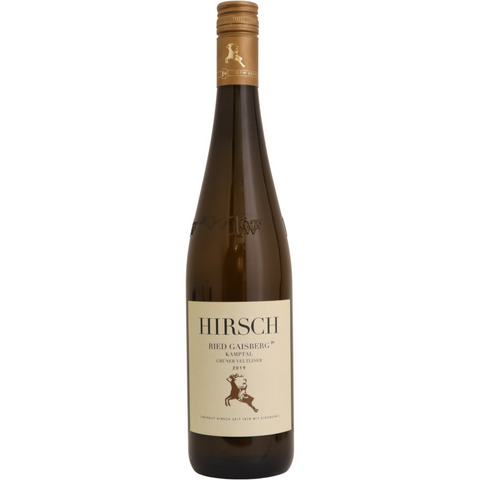
2019 Hirsch "Ried Kammern Gaisberg 1 ÖTW" Grüner Veltliner, Kamptal, Austria
The palate reveals secrets of fine, smooth yeastiness that has salty folds of crushed herb savoriness. A fine citrus freshness not only adds zing but also a welcome, textured pithiness. This is a lovely, elegant wine that needs a little patience.
ABOUT THIS WINE
The slopes of this wine-growing area vineyard extend eastwards from the Heiligenstein mountain; they have a clear southerly aspect and an average gradient of about 11%. The low-lying areas have highly calcareous chernozem soils with fragments of crystalline rocks, derived from the underlying loess which in turn overlies gravel beds. The upper parts of the slopes consist predominantly of gneiss with amphibolite lenses, and occasional remnants of loess. The overlying soil is calcareous brown earth with varying proportions of coarse material. Where the brown earth rests directly on gneiss it is generally non-calcareous but it may be calcareous where it has developed on amphibolite.
ABOUT THIS PRODUCER
If wines reflect the winemaker, Johannes Hirsch’s collection of Rieslings and Grüner Veltliners are full of energy and vitality. In the 1970s, ‘Hannes’ father started organic farming and in 2006, he was one of the founding members of Respekt – a new biodynamic certification started as an alternative to Demeter, which was then the only certification. Respekt has branched out from Austria and now covers “German speaking areas” including Northern Italy and Germany. Respekt is an independent organization and takes a holistic view to Biodynamics; the charter that members sign onto is a set of criteria which is certified twice per year by Lacon – it is not a “certification by way of an honor system” as some naysayers have suggested.
In the vineyard Hirsch uses biodynamic preparations and follows the lunar cycle for vineyard work. Eighty five percent of his holdings are in the slopes in the villages of Zöbing and Kammern, home to the Heiligenstein and Gaisberg Riesling vineyards as well as Lamm, Grub, Renner and Kammerner Gaisberg for Grüner Veltliner, though he is quick to note that “the grape variety is just a way to transport terroir. One hundred years ago, you might just find the village name on the label or the vineyard and no mention of the variety; it was not so important.” A full two thirds of his holdings are in classified, Erste Lagen vineyards.
In addition to bio-dynamic practices, Hirsch utilizes soft pruning, a method he learned in Alto Adige to minimize the amount of cuts and thus lessening the amount of tissue exposed to disease and old wood near the pruned area. In the vineyards, manure from celebrated cheese maker Robert Paget’s water buffalo and goats, grazing in the pastures in front of the vineyards, are used.
Details:
| Grape(s) | Grüner Veltliner |
| Farming | Organic |
